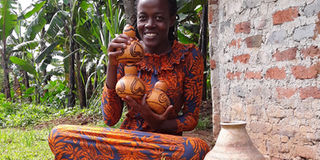29-year-old focusing on preserving African culture

Katushemererwe displays some of the item associated with culture. Photos by Rajab Mukombozi
What you need to know:
One time, Katushemererwe and her colleagues cancelled a cultural event in Mbarara because it was associated with devil worship. This, among other frustrations before that thrust her resolute to sacrifice whatever it takes to awaken the African spirit and culture.
Born 29 years ago in Kandekye, Nyabutobo, Kyeizooba in Igara, Bushenyi District, Brenda Katushemererwe’s love for culture dates back to her childhood.
Katushemererwe grew up in complete admiration of village life directly connected to traditions and practices.
It is this background and the challenges she faced along the way that strengthened her resolve to fight for her culture and identity.
Inspiration
“Life in the village was diverse and interesting. You learnt how to cook, farm, collect firewood and grind millet, among others. Because of all these, I fell in love with my culture,” she says.
However, as she grew up, the different situations she ecnountered almost made her believe that African culture is backward and outdated. She focused on her studies and later graduated with a Bachelors in Environmental Science from Makerere University in Kampala.
“After graduation, I was exposed to reading, watching documentaries, struggling for personal development, job hunting and trying to find the meaning of life. It’s when I came to learn that the problem I was facing was lack of cultural identity and values. I learnt that as Africans, we have all it takes to liberate ourselves from social-economic challenges as long as we get rid of that limiting mentality,” adds Katushemererwe.
In 2015, Katushemererwe and her colleagues booked a venue in Mbarara for a cultural function but two days to the event, the booking was cancelled because the event was considered a certain form of devil worship.
Starting AFAAD
In 2016, Katushemererwe, started Africa for Africa and African Descendants (AFAAD), a non-governmental organisation with the main objectives of unity, revival of African culture and traditions as being key in empowering Africans towards social-economic transformation.
“What is wrong with defining ourselves for ourselves instead of watching as we are swallowed up by other people’s fantasies? We are Africans, and should be proud of ourselves and embrace our culture,” she says.
The organisation has a membership of more than 1,000 people in Africa and the diaspora.
Activities
This group is now engaged in several activities mainly retreats. Kushemererwa says since starting the organisation, they have held three successful retreats, the first in Entebbe and the rest in Mbarara.

Katushemererwe says through organising retreats, they are able to showcase innovations, music, dance and drama.
She says during the retreats, there are lecturers and inspiration speeches, competitions in agriculture, innovations, music dance and drama, parading of different forms of craft and African basic innovations to achieve African pride, and meetings to lay strategies towards progress of African people.
Challenges
Katushemererwe says the organisation still faces challenges, especially funding. She says at the moment, funding only comes from members’ contributions.
“A number of my former schoolmates and friends could not stand with me, thinking what I was trying to do was outdated,” she says adding that another challenge is ignorance, especially on the role of African culture in solving day to day issues in our lives.
Way forward
The organisation is looking to form more partnerships to facilitate its activities and visibility across the world.
They also aim to strengthen collaboration with respective governments in awakening the Pan African spirit. “The Pan African spirit encourages work. Awakening the Pan African spirit will help in supplementing government efforts to development,” she says.
She hopes that in future, funds will be raised to start a museum where African literature will be collected, and used as an education tool for African cultural revival.
What others say
D’yana Kaprece, member of AFAAD, “The inability to understand our history is the reason we are lagging behind. We try to copy whatever is given to us, we need to revitalise our practices and customs.”
Emmanuel Byamugisha, member of AFAAD, “What replaced our culture was not to empower Africans but serve western countries interests and remain dependents. It’s high time we redefine our roots.”
Mustafa Timtope, Nigerian and member of AFAAD, “When we come together, revive our culture and traditions we will make a difference and through AFAAD we are committed to traverse the whole of Africa and diaspora for unified cause of reviving African culture.”




